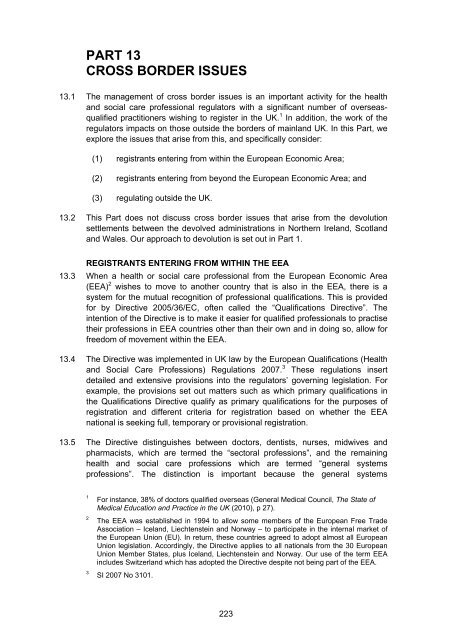Regulation of Health and Social Care Professionals Consultation
Regulation of Health and Social Care Professionals Consultation
Regulation of Health and Social Care Professionals Consultation
You also want an ePaper? Increase the reach of your titles
YUMPU automatically turns print PDFs into web optimized ePapers that Google loves.
PART 13<br />
CROSS BORDER ISSUES<br />
13.1 The management <strong>of</strong> cross border issues is an important activity for the health<br />
<strong>and</strong> social care pr<strong>of</strong>essional regulators with a significant number <strong>of</strong> overseasqualified<br />
practitioners wishing to register in the UK. 1 In addition, the work <strong>of</strong> the<br />
regulators impacts on those outside the borders <strong>of</strong> mainl<strong>and</strong> UK. In this Part, we<br />
explore the issues that arise from this, <strong>and</strong> specifically consider:<br />
(1) registrants entering from within the European Economic Area;<br />
(2) registrants entering from beyond the European Economic Area; <strong>and</strong><br />
(3) regulating outside the UK.<br />
13.2 This Part does not discuss cross border issues that arise from the devolution<br />
settlements between the devolved administrations in Northern Irel<strong>and</strong>, Scotl<strong>and</strong><br />
<strong>and</strong> Wales. Our approach to devolution is set out in Part 1.<br />
REGISTRANTS ENTERING FROM WITHIN THE EEA<br />
13.3 When a health or social care pr<strong>of</strong>essional from the European Economic Area<br />
(EEA) 2 wishes to move to another country that is also in the EEA, there is a<br />
system for the mutual recognition <strong>of</strong> pr<strong>of</strong>essional qualifications. This is provided<br />
for by Directive 2005/36/EC, <strong>of</strong>ten called the “Qualifications Directive”. The<br />
intention <strong>of</strong> the Directive is to make it easier for qualified pr<strong>of</strong>essionals to practise<br />
their pr<strong>of</strong>essions in EEA countries other than their own <strong>and</strong> in doing so, allow for<br />
freedom <strong>of</strong> movement within the EEA.<br />
13.4 The Directive was implemented in UK law by the European Qualifications (<strong>Health</strong><br />
<strong>and</strong> <strong>Social</strong> <strong>Care</strong> Pr<strong>of</strong>essions) <strong>Regulation</strong>s 2007. 3 These regulations insert<br />
detailed <strong>and</strong> extensive provisions into the regulators’ governing legislation. For<br />
example, the provisions set out matters such as which primary qualifications in<br />
the Qualifications Directive qualify as primary qualifications for the purposes <strong>of</strong><br />
registration <strong>and</strong> different criteria for registration based on whether the EEA<br />
national is seeking full, temporary or provisional registration.<br />
13.5 The Directive distinguishes between doctors, dentists, nurses, midwives <strong>and</strong><br />
pharmacists, which are termed the “sectoral pr<strong>of</strong>essions”, <strong>and</strong> the remaining<br />
health <strong>and</strong> social care pr<strong>of</strong>essions which are termed “general systems<br />
pr<strong>of</strong>essions”. The distinction is important because the general systems<br />
1 For instance, 38% <strong>of</strong> doctors qualified overseas (General Medical Council, The State <strong>of</strong><br />
Medical Education <strong>and</strong> Practice in the UK (2010), p 27).<br />
2 The EEA was established in 1994 to allow some members <strong>of</strong> the European Free Trade<br />
Association – Icel<strong>and</strong>, Liechtenstein <strong>and</strong> Norway – to participate in the internal market <strong>of</strong><br />
the European Union (EU). In return, these countries agreed to adopt almost all European<br />
Union legislation. Accordingly, the Directive applies to all nationals from the 30 European<br />
Union Member States, plus Icel<strong>and</strong>, Liechtenstein <strong>and</strong> Norway. Our use <strong>of</strong> the term EEA<br />
includes Switzerl<strong>and</strong> which has adopted the Directive despite not being part <strong>of</strong> the EEA.<br />
3 SI 2007 No 3101.<br />
223
















